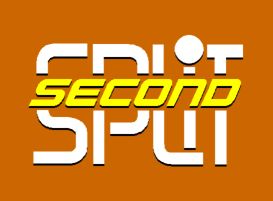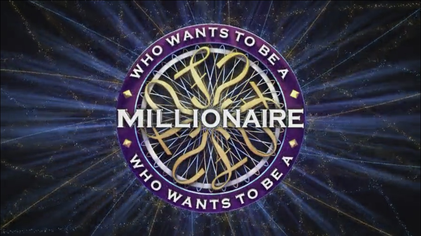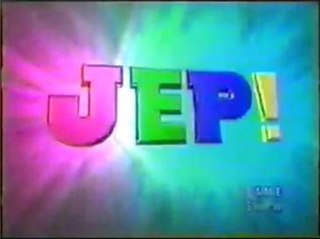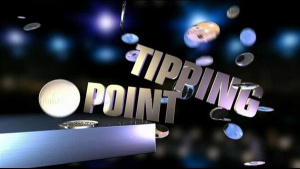Gameplay notes
Unlike in the U.S. version, contestants have points (instead of money) added or subtracted for responses (or lack of) to questions selected, a concession made because of severe restrictions on game show prizes in the UK at the time. The original point values were 5 to 25 in the Jeopardy! Round and 10 to 50 in Double Jeopardy! There were three Daily Doubles in each round.
In the Hobson, Donat, and Jones runs, the contestants only saw their own scores, although, at the end of each round, they were told their relative positions, i.e., who was in first place, who was in second, and who was in third.
Also under Hobson, Donat, and Jones, the response had to be grammatically correct in addition to the usual requirement of phrasing in the form of a question. For example, a response that began "Who is..." when a "What is..." prefix was grammatically correct would be disallowed, and the contestant would be charged a penalty.
By the time Paul Ross took over the show, the points had increased to the current 100 to 500 (Jeopardy! round) and 200 to 1000 for Double Jeopardy! The Daily Double amount was reduced to the standard one for the Jeopardy! Round and 2 for Double Jeopardy!
The player leading after Final Jeopardy! won £500; five consecutive wins earned £3,000 with the undefeated champion retiring. During the Steve Jones series, the top three champions of each series played Master Jeopardy! for the grand prize of a holiday. For the 1993 series, players scored pounds.
During the original ITV versions, the set was blue for the Jeopardy! Round and red for the Double Jeopardy! round, as in the American version. Unlike America's version, however, the set turned yellow for Final Jeopardy!; this was dropped for the program's third series.
The Derek Hobson/Channel 4 run of Jeopardy! aired before the U.S. version with Alex Trebek had debuted or been finalised and was thus based upon the original Art Fleming-hosted version of the game.

George Alexander Trebek is a Canadian-American television personality. He has been the host of the syndicated game show Jeopardy! since it was revived in 1984, and has also hosted a number of other game shows, including The Wizard of Odds, Double Dare, High Rollers, Battlestars, Classic Concentration, and To Tell the Truth. Trebek is contracted to host Jeopardy! until 2022.

Arthur Fleming Fazzin was an American actor and television host. He is most notable for being the original host of the television game show Jeopardy!, which aired on NBC from 1964 until 1975.

Who Wants to Be a Millionaire? is an international television game show franchise of British origin, created by David Briggs, Mike Whitehill and Steven Knight. In its format, currently owned and licensed by Sony Pictures Television, contestants tackle a series of multiple-choice questions to win large cash prizes, with the format being a twist on the game show genre – only one contestant plays at a time, similar to radio quizzes; contestants are given the question before attempting an answer, and have no time limit to answer questions; and the amount offered increases as they tackle questions that become increasingly difficult. The maximum cash prize offered in most versions of the format is one million of the local currency.

The Krypton Factor is a British game show produced by Granada Television for broadcast on ITV. The show originally ran from 7 September 1977 to 20 November 1995, and was hosted by Gordon Burns and usually broadcast on the ITV network on Mondays at 7pm.
Remote Control is a TV game show that ran on MTV for five seasons from 1987 until 1990. It was MTV's first original non-musical program, and first game show. A concurrent syndicated version of the series ran during the 1989-90 season, and was distributed by Viacom. Three contestants answered trivia questions on movies, music, and television, many of which were presented in skit format.
The Joker's Wild is an American television game show that has aired at different times since the 1970s. Contestants answer questions based on categories determined randomly by a mechanism resembling a slot machine. The show's title refers to the game's slot-machine mechanism also having jokers.
Idiot Savants was an American television game show on the MTV network which ran from December 9, 1996 to April 25, 1997. It was created by Michael Dugan and Chris Kreski, directed by Steve Paley, and hosted by comedian Greg Fitzsimmons.

Celebrity Squares is a British comedy game show based on the American comedy game show Hollywood Squares. It first ran from 20 July 1975 to 7 July 1979 and was hosted by Bob Monkhouse, then from 8 January 1993 to 3 January 1997 and was also hosted by Monkhouse.

Debt was an American game show hosted by Wink Martindale which aired on Lifetime from June 3, 1996 to August 14, 1998. The show featured contestants who were trying to earn money to get out of debt.

Split Second is a game show that was created by Monty Hall and Stefan Hatos and produced by their production company, Stefan Hatos-Monty Hall Productions.

Who Wants to Be a Millionaire? is a British television quiz show, created and produced by David Briggs, and made for the ITV network. The show's format, devised by Briggs, sees contestants taking on multiple-choice questions, based upon general knowledge, winning a cash prize for each question they answer correctly, with the amount offered increasing as they take on more difficult questions. To assist each contestant who takes part, they are given lifelines to use, may walk away with the money they already have won if they wish not to risk answering a question, and are provided with a safety net that gives them a guaranteed cash prize if they give an incorrect answer, provided they reach a specific milestone in the quiz.

Wheel 2000 is a children's version of the American game show Wheel of Fortune. The show was created by Scott Sternberg and was hosted by David Sidoni, with Tanika Ray providing voice work and motion capture for a virtual reality hostess named "Cyber Lucy". The show premiered on September 13, 1997 on CBS, aired as part of the network's attempt to meet the then-new E/I mandates during its Saturday morning block, and ran through February 7, 1998 with repeats continuing through September 26. Game Show Network broadcast Wheel 2000's episodes concurrently with their airings on CBS. It was taped at Sony Pictures Studios.

Jep! is an American children's television game show, adapted from the quiz show Jeopardy!. It aired first on Game Show Network throughout the 1998–99 season, and then on Discovery Kids through late 2004. It was hosted by cartoon voice actor Bob Bergen, and created by Scott Sternberg who had earlier created Wheel 2000, a children's version of Wheel of Fortune. The show's production involved many of the daily syndicated Jeopardy!'s then-current personnel, including director Kevin McCarthy and four of the nine writers that the show employed at the time, and Alex Trebek, the main Jeopardy! series' host, served as Jep!'s creative consultant. Unlike the main Jeopardy! series, Jep! was taped at Stage 11 of the Sony Pictures Studios, rather than Stage 10.
Sale of the Century is a British game show based on a US game show of the same name. It was first shown on ITV from 9 October 1971 to 6 November 1983, hosted by Nicholas Parsons. Special edition Celebrity Sale of the Century aired occasionally, starting on 2 January 1981 with Steve Jones as a host. The first series was supposed to air only in the Anglia region, but it rolled out to other regions since 8 January 1972 and achieved full national coverage by the end of 10 May 1975, at which point it was one of the most popular shows on the network – spawning the often-mocked catchphrase "and now, from Norwich, it's the quiz of the week." Since Norwich was considered something of a backwater compared to London, it was often used ironically.

Wheel of Fortune was a British television game show based on the American show of the same name created by Merv Griffin. Contestants compete to solve word puzzles, similar to those used in Hangman, to win cash and prizes. The title refers to the show's giant carnival wheel that contestants spin throughout the course of the game to determine their cash and/or prizes. The programme aired between 19 July 1988 and 21 December 2001 and was produced by Scottish Television (STV) for the ITV network - having effectively replaced Now You See It as STV's prime time game show offering for the ITV network. It mostly follows the same general format from the original version of the programme from the United States, with a few minor differences.
Let's Go Back is a nostalgia-based game show that tested contestants' knowledge of pop culture from 1950 to 1989. It ran on Nostalgia Television from July 8, 1991 to May 28, 1993, with reruns airing sporadically for a number of years thereafter. Scott Sternberg was the host, creator and executive producer, while Charlie O'Donnell held announcing duties.
Love Me, Love Me Not is a Canadian game show based on the Italian game show, M'ama Non M'ama, which in English means "love me, love me not". The program originally aired in Canada in 1986 and debuted on the USA Network in the United States (US) on September 29, 1986. Ross Shafer was the host and Jane MacDougall was the co-host/announcer; MacDougall was later replaced by Marilyn Smith.
Now You See It was a Scottish television game show that aired mostly in Scotland throughout its run. It was shown to a lesser degree across some of the ITV Network. It was based upon the U.S. version of the show and used the US show's "halftime cue" as its theme music.

Tipping Point is a British television game show which began airing on ITV on 2 July 2012, and is presented by Ben Shephard. Four contestants answer general knowledge questions to win counters which they use on a large coin pusher arcade-style machine. Only the winner at the end has a chance to take home any money; the others leave with nothing except any non-cash prizes they may have won during the game.

Let's Ask America is an American interactive game show which debuted September 17, 2012. The program features contestants who play from their homes via webcams, answering trivia questions relating to current events. On November 4, 2013, it was announced that Scripps planned to launch Let's Ask America nationwide through a distribution deal with MGM Television. Contestants participate by Skype from the comfort of their own home, an inexpensive technology negating the need for travel expenses. In sweeps months, the show features celebrity editions featuring local news talent from the stations carrying the series such as meteorologists and anchors playing the game from their station's studios for local charities.

The Chase is an American television quiz show based on the British program of the same name. The show premiered on August 6, 2013, on Game Show Network (GSN). It is hosted by Brooke Burns, and features Mark Labbett as the "chaser".














